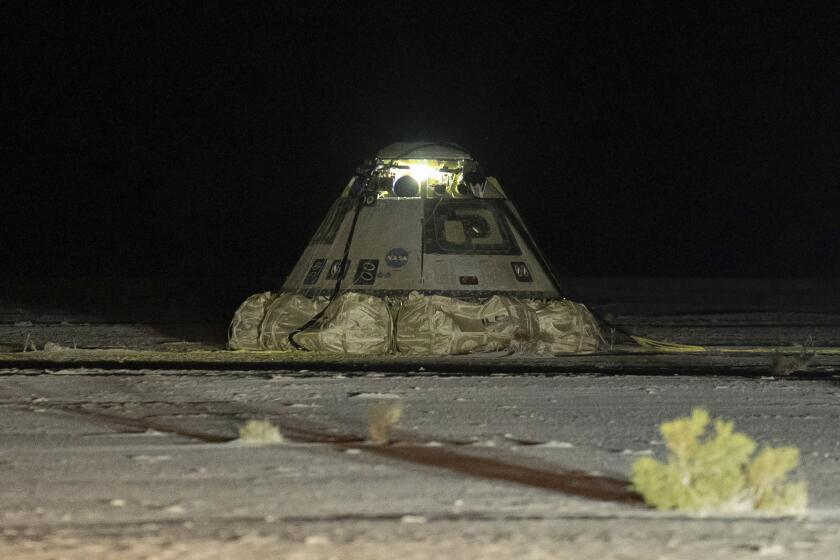Hagel says U.S. acted swiftly to protect ex-POW Bowe Bergdahl’s safety
Senior Republicans on Sunday criticized President Obama for releasing five Taliban prisoners to secure the return of an American prisoner of war, arguing that it breached longstanding U.S. policy against negotiating with terrorists.
“What does this tell the terrorists, that if you capture a U.S. soldier you can trade that soldier for five terrorists,” Sen. Ted Cruz (R-Texas) said on ABC’s “This Week,” adding that it was a “change in U.S. policy” that was “very disturbing.”
But a day after Obama announced that Army Sgt. Bowe Bergdahl, a Taliban prisoner for nearly five years, had been freed in Afghanistan, administration officials defended the deal.
Defense Secretary Chuck Hagel told reporters traveling with him on a visit to Afghanistan that the administration had decided to go ahead with the prisoner exchange because Bergdahl’s “safety and health were both in jeopardy.”
The U.S. had indications, including from a video of Bergdahl that surfaced in January, that his health was “deteriorating,” Hagel said. He added that securing his release was urgent “to save his life.”
The need to move quickly to get Bergdahl released when the opportunity arose last week prevented Obama from giving Congress the required 30-day notice before transferring Guantanamo prisoners, Hagel said.
Sen. John McCain (R-Ariz.), a prisoner of war during the Vietnam War, called the five Taliban prisoners, who were turned over to the custody of the government of Qatar, “the hardest of the hard core” who were “possibly responsible for the deaths of thousands.”
Speaking on CBS’s “Face the Nation,” he added: “We need more information about the conditions of where they’re going to be and how. But it is disturbing that these individuals would have the ability to reenter the fight.”
Hagel said in an interview on NBC’s “Meet the Press”: “I don’t think that what we did in getting our prisoner of war home would in any way encourage terrorists to take hostages.”
He dismissed questions about whether the military would investigate reports that Bergdahl may have left his base without authorization when he was taken captive, saying the priority was making sure he was healthy and reuniting him with his family.
The Pentagon said Sunday that Bergdahl, who is said to be in good physical condition, had been flown from Afghanistan to a U.S. military hospital in Landstuhl, Germany.
Doctors “will evaluate his condition, begin any necessary medical care, and assist in his recovery,” the military said in a statement.
He is expected to be flown in several days to another military hospital in Texas for further treatment, officials said.
Susan Rice, Obama’s national security advisor, dismissed GOP criticism that the deal to get Bergdahl home would put other soldiers at risk of being taken hostage. She also denied that the deal violated a U.S. practice against negotiating with terrorists.
“This is a very special situation,” she said on “This Week,” noting that getting Bergdahl back was a “sacred obligation” that required reaching a deal with a “non-state actor.”
In previous wars, the U.S. typically exchanged prisoners with other governments when the conflicts were over. But in this case, Bergdahl was being held by the Haqqani network, a militant group closely linked to the Taliban.
Rice said that the five Taliban prisoners transferred from Guantanamo will be sent to Qatar, whose government brokered the deal and will be subject to “monitoring” and restrictions on their movement and activities.
“In all likelihood, [the returned prisoners] will not pose a national security risk,” she said.
Rep. Adam Kinzinger (R-Ill.), a pilot in the Air Force reserves who flew missions in Iraq and Afghanistan, said he was relieved that Bergdahl was home.
But he added on “Meet the Press “ that “this whole exchange is shocking to me” and raised “a lot of questions.”
The released prisoners -- Mohammad Fazl, Mullah Norullah Noori, Mohammed Nabi, Khairullah Khairkhwa and Abdul Haq Wasiq -- were high-ranking officials during the decade before 2001 when the Taliban ruled Afghanistan.
Several had been accused by U.S. military prosecutors of helping Osama bin Laden in Afghanistan before 2001 or in Taliban military activities. Several had been designated by the military as enemy combatants who would be held indefinitely at Guantanamo.
More to Read
Sign up for Essential California
The most important California stories and recommendations in your inbox every morning.
You may occasionally receive promotional content from the Los Angeles Times.











